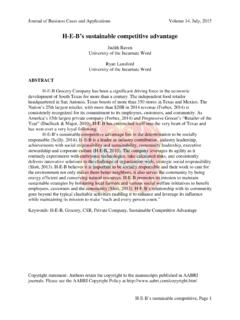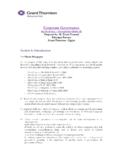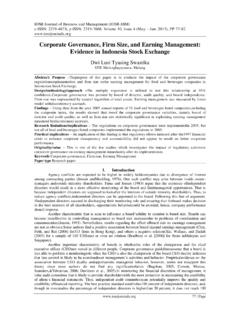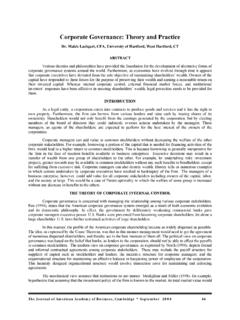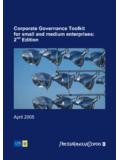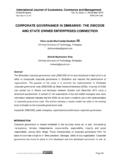Transcription of Corporate governance and firms’ financial performance
1 Journal of Academic and Business Ethics Corporate governance and firms, page 1 Corporate governance and firms financial performance Sekhar Muni Amba New York Institute of Technology, Bahrain ABSTRACT In the light of Corporate financial scandals, there is an ever increasing attention on Corporate governance issues. As the investors look for emerging economies to diversify their investment portfolios to maximize returns they are equally concerned about governance factors to minimize risks in these economies. This paper examines the impact of Corporate governance variables on firms financial performance . Influence of Corporate governance variables CEO duality, Chairman of Audit Committee, Proportion of Non-executive Directors, Concentrated Ownership structure, Institutional Investors, Gearing Ratio on firms financial performance Return on Assets is researched using the firms traded in Bahrain bourse. This research finds that Corporate governance variables do influence firms performance .
2 CEO duality, proportion of non-executive directors and leverage has negative influence and board member as chair of audit committee, proportion of institutional ownership has positive influence on firms financial performance Keywords: Corporate governance , financial performance , Bahrain Copyright statement: Authors retain the copyright to the manuscripts published in AABRI journals. Please see the AABRI Copyright Policy at Journal of Academic and Business Ethics Corporate governance and firms, page 2 INTRODUCTION At the culmination of every financial crisis academicians, regulators, governments tend to focus on the Corporate governance more vigorously in order to enhance investors confidence that would attract investments. The Corporate governance framework should promote transparent and efficient markets, be consistent with the rule of law and clearly state the division of responsibilities among different supervisory, regulatory and enforcement authorities.
3 Corporate governance describes the structure of rights and responsibilities among the parties that have a stake in a firm (Aguilera and Jackson, 2003). A Corporate governance system can be a set of processes and structures used to direct a corporation's business. A key objective of a Corporate governance system should be the enhancement of shareholder wealth. Once implemented, an effective Corporate governance system can help to ensure an appropriate division of power among shareholders, the board of directors, and management (Mcconomy et al. 2000). According to Bairathi, V. (2009). Corporate governance is not just Corporate management; it is something much broader to include a fair, efficient and transparent administration to meet certain well-defined objectives. It is a system of structuring, operating and controlling a company with a view to achieve long term strategic goals to satisfy shareholders, creditors, employees, customers and suppliers, and complying with the legal and regulatory requirements, apart from meeting environmental and local community needs.
4 When it is practiced under a well-laid out system, it leads to the building of a legal, commercial and institutional framework and demarcates the boundaries within which these functions are performed. Well-functioning Corporate governance mechanisms in developing economies are crucial for both local firms and foreign investors interested in the tremendous opportunities that such economies provide. Evidence suggests that firms in emerging economies (compared with their counterparts in developed countries) are discounted in financial markets because of weak governance (LaPorta, Lopez-de-Silanes, Shleifer, and Vishny, 1999). As such, improvements in Corporate governance can enhance investor confidence and increase these firms' access to capital (Rajagopalan and Zhang, 2009). In this context, from the time when the Kingdom of Bahrain signed Free Trade Agreement with USA in 2004 followed by substantial foreign investment in Kingdom of Bahrain, firms would demand greater transparency and internationally recognized sound Corporate practices in Kingdom of Bahrain.
5 To this effect Central Bank of Bahrain has released Corporate governance code 2010 that is to be followed by companies and business establishments in Kingdom of Bahrain. Central Bank of Bahrain perceived that the new paradigm of governance to bring about quality Corporate governance is not only a necessity to serve the diverse Corporate interests, but it is also a key requirement in the best interests of the corporates themselves. Corporate practices in the matter of disclosure, transparency, group accounting, role of directors, degree of accountability to the shareholders, lenders and overall public good are some of the critical issues which require a continues modification to suit to the changing dynamic business environment (Central bank of Bahrain 2010) .Governments can play a major role in creating the environment for quality governance through an appropriate regulatory frame work. Journal of Academic and Business Ethics Corporate governance and firms, page 3 RESEARCH OBJECTIVES The objective of this research is to study the impact of Corporate governance variables: CEO as board of director CEO as Chairman of the board, Chairman of Audit Committee, Proportion of Non-executive Directors, Concentrated Ownership structure, Institutional Investors, and Gearing Ratio on firm s profitability ratios Return on Assets and Return on Equity.
6 LITERATURE REVIEW There has been wide variety of interest among researchers, scholars and governments, including global agencies in the realm of Corporate governance especially after the financial crisis 2008 that lead collapse of many financial institutions and virtually brought many industries to bankruptcy. Cheffins (2011) said Corporate governance first came into vogue in the 1970s in the United States. With the collapse of Enron and Arthur Andersen in the and similar disasters in the such as Marconi, Corporate governance has become increasingly important. As a result, international organizations have shown concerns about governance issues. The international monetary fund has demanded that governance improvements be included in its debt relief program (Khanchel, 2007).In 1999, the Organization of Economic and Development (OECD) issued its influential OECD principle of Corporate governance , intended to assist member and non-member countries in their efforts to evaluate and improve the legal, institutional and regulatory framework for better Corporate governance (Nestor, S.)
7 , & Thompson, J. 2001). CEO duality CEO duality means that the CEO is also holding a position as a chairman of the board of directors. Agency theorists argue that when a board chairman is also a CEO, he will gain sufficient controlling power to gain more private benefits (Finkelstein and D'Aveni, 1994). Chugh, L. C., Meador, J. & Meador, M. (2010) found that CEO-duality describes a situation in which the CEO and the board chair is one and the same person. It is argued that situations in which the CEO is also the chair may enhance the performance of the firm as there is one responsible and accountable steward. This means that one person has the full power to take any decision. Brickley, J. A., Coles, J. L., & Jarrell, G. (1997) said that separating a chairman and a CEO of the board yields both costs and benefits, and larger firms seem to experience higher costs than smaller firms in this situation. To examine the effect of duality of CEO on firm value multiple studies have found that the existence of with a weak legal system encourages companies its CEO acts as a chairman of the the contrary Ehikioya, B.
8 I. (2009) at their study said CEO duality has a way of influencing the overall performance of the firm . However, research also supports the idea that combining the positions of CEO and chair in one person may prevent the board from effectively exercising its monitoring and oversight duties (creating agency costs) and will result in lower performance (Coles, , McWilliams, & Sen, N. 2001).Core, , Journal of Academic and Business Ethics Corporate governance and firms, page 4 Holthausen, and Larcker, (1999) found that high CEO compensation is associated with weak governance structures including CEO duality. Independent and non-executive directors The primary role of the executive directors is to implement the strategy agreed by the board, the chief executive is the main interface with the board and, indeed, in North America is often the only executive member of the board, the executives are the full time managers of the business and it is they, not the non-executives, who are the true custodians of the business.
9 If the executives choose they can blind and deceive until they are caught, the hope is, as is the case in most of our businesses, that they are honest and direct and seek to run the enterprise morally, ethically and within the law. If they do not the full weight of the law should be used against them Treadwell, D. (2006). Mak and Kusnadi (2005) reveal that a higher fraction of independent directors on the board is linked to greater firm and Theodorou (1998) suggest that the relationship between non-executive directors (including independent directors and grey directors) and firm valuation is not significant. Yammeesri, J., & Herath, S. K. (2010) said at their research that it is still debatable whether non-executive directors will perform well in monitoring firm management and whether their performance could reflect an increase or decrease in Corporate performance . In the case of Thai firms, there is no evidence to confirm that independent directors are significantly related to firm value.
10 As per the study of Rashid, A., De Zoysa, A., Lodh, S., & Rudkin, K. (2010). the Independent non-executive directors are appointed from outside and they should not have any material interest in the firm . Arguments have been presented challenging the limitations of outside independent directors. Nicholson and Kiel (2007) argue that inside directors live in the company they govern, they better understand the business than outside directors and so can make better decisions. As per Rashid et al. (2010) their argument is one of information asymmetry between inside directors and outside independent directors, they argue that a lack of day to day inside knowledge may reduce the control role of the independent directors in the firm , and that the independent directors may fail to perform because lack of appropriate support by the inside directors. Cho and Kim (2007) and Brennan, N. M., & Solomon, J. (2008). also questions the value of outside independent directors, as they may not be competent to perform their assigned tasks in that they are part-timers and do not have inside information of the firm .


